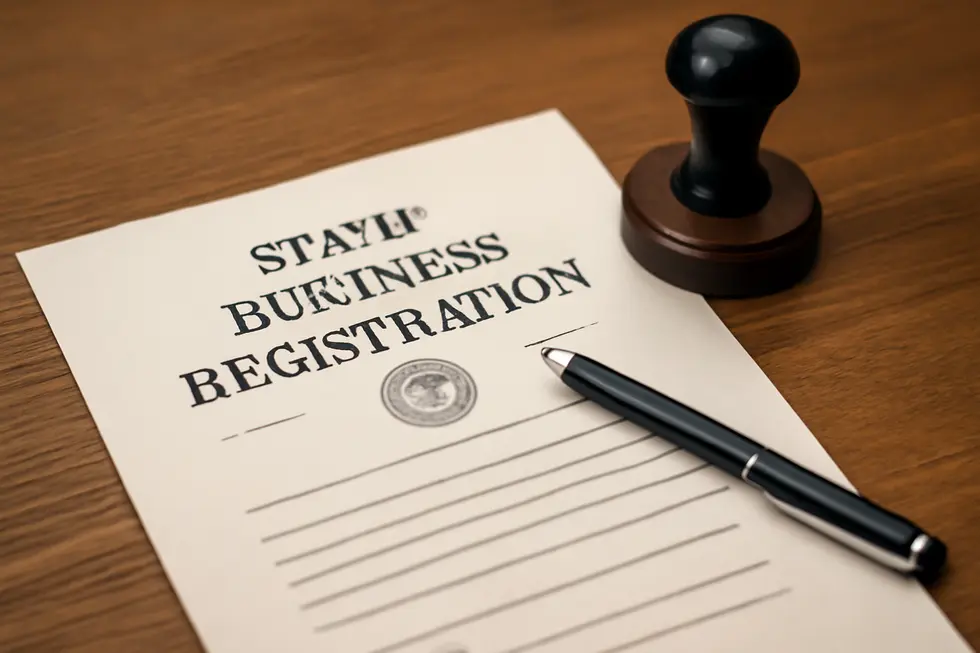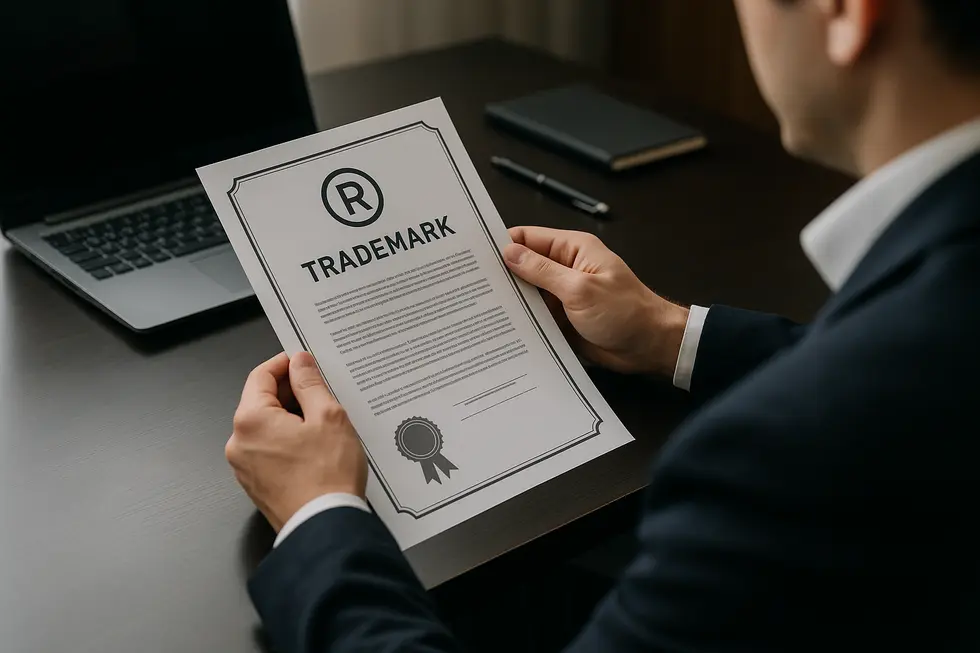导言
Choosing the right name for your business is more than a branding decision—it’s a crucial legal consideration. Many business owners wonder if they can use the same business name as another company. The answer involves navigating a combination of state registration rules, federal trademark law, and careful research. Each jurisdiction has its own regulations ensuring business name uniqueness within their borders, but broader protections can come from trademark law. To protect your brand and avoid costly legal conflicts, it’s essential to understand where and how your chosen name can be used exclusively. This discussion unpacks the state-level restrictions on business names, explores how federal trademark law governs name protection across industries and regions, and highlights the best practices for searching, reserving, and legally securing your business name before launch.
目录
Chapter 1: Can I Have the Same Business Name: State Registration Restrictions and Uniqueness Requirements
- Navigating State Rules for Unique Business Names: Registration, Reservation, and Restrictions
- Balancing Federal Trademark Rights and State Business Name Registration for Unique Branding
- Navigating Name Reservation, DBA Filings, and State-Specific Rules for Business Name Uniqueness
Chapter 2: Can I Have the Same Business Name: Federal Trademark Law and Its Role in Name Protection
- How Federal Trademark Law Strengthens Your Business Name Protection Nationwide
- How Consumer Confusion Shapes Federal Trademark Protection for Business Names
- Mastering Business Name Security: Key Strategies for Leveraging Federal Trademark Protections
Chapter 3: Navigating Business Name Searches, Reservations, and Registration Requirements
- Mastering State-Level Business Name Search and Reservation: Essential Steps to Secure Your Unique Identity
- Navigating Legal Boundaries: Key Restrictions and Trademark Risks When Using Business Names
- Understanding the Legal Roles of Trademarks, DBAs, and Business Names in Name Selection
Chapter 1: Can I Have the Same Business Name: State Registration Restrictions and Uniqueness Requirements

1. Navigating State Rules for Unique Business Names: Registration, Reservation, and Restrictions
State business name registration is a critical step that establishes your brand’s legal presence within a particular jurisdiction. States require that business names be unique and clearly distinguishable from those already registered. This rule aims to prevent consumer confusion and protect the integrity of existing businesses. To comply, you must begin by conducting a thorough availability check through your state’s Secretary of State online search tool. This step filters out exact matches or names that are deceptively similar to existing entities.
Beyond availability, many states allow you to reserve your preferred name for a limited time—often between 30 to 180 days—preventing others from claiming it while you finalize your registration. However, a reservation does not guarantee approval if the name violates specific state naming rules. Business names must include appropriate entity designators such as “LLC,” “Inc.,” or “Corp.” These suffixes clarify your company’s legal structure and are mandatory in most states.
Certain words are restricted or require special permissions due to their sensitive or regulated nature. Terms like “Bank,” “University,” or “Insurance” often trigger rejection or require state licensing. Additionally, if you plan to operate under a different name than your registered business name, filing for a DBA (Doing Business As) is necessary. DBA names must also meet the uniqueness guidelines and cannot falsely imply a different legal status.
Importantly, state name registration protections are limited geographically. The same or a similar name can be used legally in another state unless federally trademarked. To navigate these nuances effectively, consult your state’s business registry and consider legal advice. A well-chosen, compliant name not only avoids registration hurdles but also strengthens your brand identity within your state’s market.
For detailed guidance on name reservations and restrictions, see resources such as Ohio’s 180-day reservation rule at MyCorporation. Also, explore more on protecting your business identity through trademark protection insights.
2. Balancing Federal Trademark Rights and State Business Name Registration for Unique Branding
Understanding the distinction between federal trademark registration and state-level business name registration is crucial when determining if you can use the same business name.
Federal trademarks provide nationwide protection and confer significant legal advantages. With federal registration, a business gains presumptive ownership across the United States, the ability to enforce rights in federal courts, and the use of the ® symbol. Additionally, after five years of continuous use, a federally registered trademark can become incontestable, greatly strengthening its protection against infringement. However, this process is more costly, complex, and time-consuming than state registration, often requiring professional legal guidance to navigate.
Conversely, state business name registration primarily serves the purpose of preventing identical or confusingly similar names from coexisting within the same state. Each state mandates that registered business names be distinguishable to avoid customer confusion, imposing specific naming requirements such as the inclusion of entity designators like “LLC” or “Inc.” and restricting usage of certain words without proper licensing. Unlike trademarks, state business name registrations protect only the name of the business entity itself and do not confer exclusive rights beyond the state’s borders. The process is generally quicker and less expensive, offering basic name protection within that jurisdiction but lacking the broader legal muscle of federal registration.
This differentiation means a business might register a name at the state level but still face limitations if a federally registered trademark exists for that or a similar name elsewhere. Only federal trademark protection provides a truly exclusive right nationwide and safeguards against confusingly similar names in related industries. Before selecting a business name, it is wise to perform thorough searches both at the state registry and the USPTO trademark database to ensure nationwide uniqueness and legal safety.
For more insights on protecting your brand effectively, exploring the benefits of business name trademark registration can be invaluable, as explained in this resource on trademark protection for your business name.
3. Navigating Name Reservation, DBA Filings, and State-Specific Rules for Business Name Uniqueness
When registering a business name at the state level, one fundamental rule applies: your name must be unique and clearly distinguishable from existing entities within that state. This is enforced rigorously during both the name reservation and formation filing process. Most states offer an option to reserve a business name before officially forming an LLC or corporation. For instance, Alabama allows name reservation for up to one year, while Nebraska offers a 120-day reservation period. This temporary hold helps secure your desired name while you prepare your business documents, but the name must meet the state’s distinctiveness criteria. Minor variations such as “LLC” versus “Inc.”, or symbols like “&” instead of “and,” usually do not suffice to differentiate names.
Beyond name reservation, if you plan to operate under a name different from your legally registered business name, you must file for a DBA (Doing Business As), also known as an assumed name. This registration is critical as it legitimizes the alternate name for contracts and legal transactions. States typically require separate DBA filings for each assumed name, and some enforce periodic renewals or demand cancellation notices when the name is no longer in use. Failing to register a DBA can result in fines, the inability to enforce contracts, or even personal liability for business debts.
It is important to note that name regulations apply independently across states. Thus, you may register the same business name for different LLCs in separate states without conflict, but proper foreign registration and compliance with each state’s uniqueness standards are necessary when doing business across state lines.
These procedural safeguards maintain clarity and protect consumers by preventing confusion. For comprehensive steps on filing and restrictions, resources such as the Nebraska Secretary of State business pages provide up-to-date guidance. To better understand the broader protections beyond state registration, consult materials on 受法律保护的品牌商标.
External resource: Name reservation and DBA in Nebraska.
Chapter 2: Can I Have the Same Business Name: Federal Trademark Law and Its Role in Name Protection

1. How Federal Trademark Law Strengthens Your Business Name Protection Nationwide
Federal trademark law is indispensable for businesses seeking strong, nationwide exclusivity over their names. Unlike state registration, which typically restricts protection to a single state and often requires prior use within that jurisdiction, a federally registered trademark grants its owner exclusive rights to use the name across the entire United States within the specified class of goods or services. This elevates the level of legal security and minimizes the risk of consumer confusion by preventing others from adopting identical or confusingly similar names in related industries regardless of state boundaries.
Before applying for a federal trademark with the U.S. Patent and Trademark Office (USPTO), it is critical to conduct comprehensive searches to uncover any existing trademarks or uses of similar marks. USPTO’s database, along with open web searches, helps identify potential conflicts that could lead to application refusal. Once the application is submitted, the review can take 10 to 16 months, during which USPTO assesses whether the mark conflicts with prior registrations. Approved marks are then published for a 30-day opposition period before final registration.
After registration, trademark owners gain several enforcement advantages. They can pursue legal action in federal courts against infringers and partner with U.S. Customs and Border Protection to block counterfeit products bearing their mark from entering the country. The mark holder is also legally entitled to display the ® symbol, signaling official federal protection.
This federal protection is particularly vital when businesses operate in multiple states or seek to expand nationally. While state registration limits protection locally, a federal trademark safeguard reduces confusion and legal disputes by clarifying ownership. To navigate these complexities and ensure effective name protection, businesses should consider federal registration as a key step. For a detailed overview of the application process and benefits, consult LegalZoom’s guidance on trademark registration.
2. How Consumer Confusion Shapes Federal Trademark Protection for Business Names
Consumer confusion is the cornerstone of federal trademark law’s approach to protecting business names. The law focuses on preventing situations where consumers might mistakenly believe two businesses are connected because their names or trademarks are alike. This confusion can harm both customers and businesses by diluting brand identity and misleading consumers about a product’s source or endorsement.
Federal trademark protection, administered by the U.S. Patent and Trademark Office (USPTO), hinges on the “likelihood of confusion” standard. This involves evaluating how similar two marks appear, sound, or feel in the marketplace, and whether the goods or services they represent are sufficiently related. Even small spelling changes or differences in design might not suffice if the overall impression confuses consumers when the businesses operate in overlapping industries or target similar markets.
The practical effect of this standard is clear: registering a trademark offers robust, nationwide protection that goes beyond state business registration, which typically only safeguards the name within a specific state. Trademark owners gain the ability to challenge confusingly similar uses anywhere in the country and can seek legal remedies, including injunctive relief and damages, if infringement occurs.
Moreover, federal trademark law addresses issues beyond basic confusion, such as trademark dilution—where a famous mark’s distinctiveness is weakened—and cybersquatting, which involves bad-faith domain name registrations aimed at profiting from a trademark’s reputation. These protections all revolve around maintaining clear associations between a business name and the quality or origin of its goods or services.
Understanding this foundational role of consumer confusion clarifies why federal trademark law is crucial when deciding whether you can use a business name similar to one already in use. To ensure your chosen name avoids conflict and remains protectable, conducting thorough federal trademark searches is essential. More details on trademark protection strategies can be found on TrademarkGold’s guide to legally protected brand trademarks.
For deeper insight into legal standards and enforcement, see the discussion on navigating likelihood of confusion refusals in trademark applications 这里.
3. Mastering Business Name Security: Key Strategies for Leveraging Federal Trademark Protections
Protecting your business name under federal trademark law requires a strategic, proactive approach that goes beyond state registration. Unlike state-level protections, which only prevent duplicate registrations within a jurisdiction, federal trademark registration grants exclusive nationwide rights to use your business name in connection with specified goods or services. This distinction is critical because it empowers you to enforce your rights through federal courts and offers presumptions of validity and incontestability after five years of continuous use. Such benefits provide stronger leverage in preventing others from adopting confusingly similar names that might dilute your brand or mislead consumers.
The cornerstone of this strategy is conducting a comprehensive trademark search before filing for registration. Utilizing the USPTO’s database and professional search services helps identify potential conflicts that could lead to application rejection or costly legal disputes. Thorough research ensures your business name stands distinct, reducing risks associated with inadvertent infringement.
Once registered, ongoing vigilance is essential. Many businesses implement trademark watch services that monitor new trademark filings and state registries. This proactive monitoring allows early detection of potentially infringing names and enables timely enforcement actions. Maintaining these efforts safeguards your exclusive rights and preserves the integrity of your brand over time.
Additionally, federal registration offers practical enforcement tools, such as barring the importation of counterfeit goods through U.S. Customs. It also can facilitate international recognition, providing a foundation for expanding name protection beyond U.S. borders.
To fully secure your business name, combining thorough pre-registration searches, federal trademark registration, and continuous name monitoring forms the most effective defense. This comprehensive approach not only ensures legal protection but also strengthens your brand’s market identity.
For more detailed guidance on trademarking your business name and maximizing legal protections, explore this resource on brand and trademark business protection and consult authoritative sources like LegalZoom’s overview of the federal trademark process.
Chapter 3: Navigating Business Name Searches, Reservations, and Registration Requirements

1. Mastering State-Level Business Name Search and Reservation: Essential Steps to Secure Your Unique Identity
When selecting a business name, ensuring that it is both available and compliant with local regulations is fundamental. Most jurisdictions require a business name to be unique within their territory, aiming to prevent public confusion and legal disputes. To confirm availability, you must perform a thorough business name search using your state or province’s official registry—commonly accessible through Secretary of State websites in the U.S. or analogous provincial platforms in Canada. This search should encompass exact matches, variations including different corporate designators such as LLC or Inc., and closely related spellings or phonetics, since many authorities reject names that are confusingly similar.
In some regions, additional verification reports, such as the NUANS report in parts of Canada, are mandatory. This process solidifies the uniqueness of your chosen name before moving forward. Once you confirm that your desired business name is available and complies with naming rules (for example, including required entity designators or excluding restricted terms like “Bank”), reserving the name becomes a practical step. Reservation holds the name for a limited period—typically ranging from 30 to 90 days—allowing you to complete registration paperwork without risk of losing your selected name. Fees for this reservation service vary by jurisdiction but are generally modest.
After reservation (if applicable), the final phase involves submitting your business registration with the verified name. This process usually entails completing specific forms and paying registration fees, which differ depending on the state or province and the nature of your business entity. It is important to note that a name once registered by an active business cannot be duplicated within the same jurisdiction. Occasionally, names from suspended or revoked entities may become available again, but this varies.
For comprehensive guidance tailored to your location, consult your regional business registry. For instance, Manitoba provides clear steps on name reservation and registration, while the CRA offers assistance for Canadian business number registrations. In all cases, carefully following search and reservation procedures helps avoid future legal challenges and sets a solid foundation for your brand identity. For further insights into protecting your business identity, exploring the benefits of trademarking names is highly recommended.
External resource: Manitoba Companies Office guidelines – https://www.companiesoffice.gov.mb.ca
2. Navigating Legal Boundaries: Key Restrictions and Trademark Risks When Using Business Names
When choosing a business name, understanding the legal boundaries is crucial to avoid conflicts and registration issues. Primarily, business names must be unique within the same state or jurisdiction to prevent customer confusion and legal disputes. This uniqueness requirement means you generally cannot register the exact same or a confusingly similar name to another registered business in your state, even if your business structures differ. The state’s business registry—often accessed through the Secretary of State’s website—serves as the first checkpoint to verify name availability during your search.
Beyond distinctiveness at the state level, there are entity-specific naming rules to consider. For instance, businesses structured as LLCs, corporations, or partnerships generally must include designators like “LLC” or “Inc.” in their legal names. Additionally, certain words, such as “Bank,” “Insurance,” or “University,” may be restricted or require special permissions due to regulatory oversight.
Crucially, state-level registration does not eliminate risks related to trademark laws. A name available for state registration might infringe on a federally registered trademark, which offers broader protection and could spark costly legal action if ignored. Therefore, searching the USPTO trademark database for existing trademarks is necessary before finalizing your business name.
If you intend to operate under a name different from your official registered one, filing a “Doing Business As” (DBA) registration is a legal option, allowing you to use an alternate name without conferring trademark rights. Some states also permit name reservations, letting you hold a chosen name temporarily during your business formation process.
Because legal nuances—especially those involving trademarks—can be complex, consulting an attorney is wise to ensure full compliance and to safeguard your brand identity effectively. Taking these steps protects you from registration rejection, cease-and-desist orders, or costly trademark disputes.
For detailed guidance on business name searches and registrations, refer to this comprehensive business name search resource. For further insights on protecting your brand beyond registration, explore how trademarks protect businesses.
3. Understanding the Legal Roles of Trademarks, DBAs, and Business Names in Name Selection
Choosing a business name involves understanding the distinct legal roles of business entity names, DBAs (Doing Business As), and trademarks, as each offers different levels of protection and implications. At the state level, registering your business name for an LLC or corporation ensures no identical entity name exists within that jurisdiction. This registration protects your legal business name within the state but does not extend beyond it or prevent others from using similar DBAs or trademarks.
DBAs allow businesses to operate under an alternate name different from their legal entity name. Unlike legal business names, DBAs typically do not grant exclusive rights, and multiple businesses can often register the same DBA name in a state. This registration serves primarily for branding or differentiating your business identity but offers limited legal protection. Failing to register a DBA when operating under a trade name can pose legal risks, including challenges in contract enforceability and potential trademark disputes.
Trademarks represent the strongest layer of protection, particularly when federally registered. Unlike state business registrations, trademarks grant exclusive rights nationwide within the scope of specific goods or services. Trademark law prevents confusingly similar names in related industries, providing legal remedies against infringement. Conducting thorough trademark searches through resources like the USPTO and state registries is essential before adopting a name.
Additionally, some states offer name reservation to temporarily hold a desired business name, but this does not confer trademark rights. To secure a unique and legally protected business identity, a layered approach is recommended: start with a state business entity search, verify DBA availability, perform a federal trademark search, and consider filing for trademark protection.
This multi-tiered process minimizes the risk of disputes and strengthens your brand’s legal standing. For a deeper dive into trademark protections and their benefits, refer to detailed resources on how trademarks prevent others from infringing on your brand. Further guidance can be found through your state’s business registration office or legal professionals specializing in intellectual property law.
最后的想法
Understanding whether you can have the same business name as another requires navigating both state and federal legal frameworks. State registration systems maintain uniqueness within their jurisdiction by refusing duplicate names that might confuse consumers. However, state-level registration alone offers limited protection, especially beyond state borders. Federal trademark law steps in to provide broader safeguards, preventing others in related industries or regions from using confusingly similar names. To confidently claim your business identity, thorough name searches at both state and federal levels are necessary, along with considering name reservation and trademark applications. These steps minimize legal risks, protect your brand’s reputation, and secure your competitive edge. Keep in mind that consulting legal experts can further strengthen your strategy and help you avoid costly conflicts in the future.
今天就申请商标!成千上万的人通过申请商标保护了自己的品牌。您还在等什么?开始申请商标吧!
关于我们
We are the globe’s top website for registering trademarks and safeguarding your brand, name, logo, or slogan. Our expert tools and resources guide you through every step of protecting your business identity with ease and confidence.







